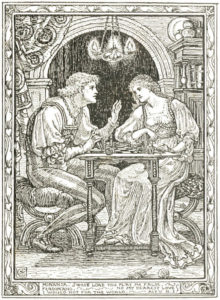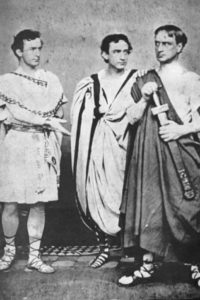What many new readers may not realize is that this blog existed in a different form, long since offline, before even June 2005 when Shakespeare Geek was born.
Yesterday I was looking for the story about the very first time I told The Tempest to my daughter as a bedtime story. I remember how it went, how they knew Shakespeare as “the name of the song that Daddy’s phone plays” because I had David Gilmour’s Sonnet 18 as my ringtone. She asked me who Shakespeare was, and I told her that he wrote the greatest stories anybody has ever written.
I found this post in my offline archives, from June 20, 2005:
I want my kids to learn Shakespeare, just like I want them to learn about computers. But at 3years old, I have to pick and choose what Katherine is exposed to. So if I’m going to pick the first play for her to learn, which should it be?
The tragedies are all right out because she doesn’t get the concept of people dying yet.
I think The Tempest is perfect. One of the main characters after all is Miranda, a naive little girl. Sure, maybe she’s a teenager in most interpretations of the play (and, I believe, according to Prospero’s math), but I don’t think that matters in fairy tale rules. All the princesses always end up getting married to a prince and living happily ever after in those. And that basically happens here, too.
So, it must have been after that :). But check it out, from January 8, 2006! A story about finding some Shakespeare books at a dollar store.
“Before leaving I came up with Shrew, Romeo and Juliet, King Lear (!), and The Tempest. I’m particularly pleased by those last two, because I am not nearly as familiar with the plot points of King Lear as I would like (who is?), and I have in the past attempted to tell The Tempest to my daughter as a bedtime story, and having a mini freeform script of the play in a pocket reference like this will possibly help me succeed in that attempt.”
In June I was thinking about it, and by January I’d done it. My plan was in full swing, apparently, by August 2006 when we went to see Taming of the Shrew with some friends in Boston. The poor woman made the mistake of telling me that Shrew was better than Hamlet, because people like comedies, not dark depressing stuff. No, wait – it gets worse:
“Know what else I hate?” this woman continues, perhaps not realizing or caring how much she has fallen in my eyes. “The Tempest.”
“I’ve read The Tempest to my 3yr old as a bedtime fairy tale,” I tell her.
“And did she understand it?”
“She asked me for it. Repeatedly.”
I don’t know if they ever found her body. 🙂



 to 1 (200k or so misquotes to about a million instances of the actual quote).
to 1 (200k or so misquotes to about a million instances of the actual quote). I wonder if somebody confused “drums of war” for “dogs of war” when they attributed this quote to Julius Caesar? Nothing about this quote shows up in the play, of course. I suppose there’s at least some possibility that it appears in actual Caesar’s actual writings, since I’m not an expert in those. But others before me have researched this question and apparently nope, not real Caesar either. This quote doesn’t appear to exist before 2001.
I wonder if somebody confused “drums of war” for “dogs of war” when they attributed this quote to Julius Caesar? Nothing about this quote shows up in the play, of course. I suppose there’s at least some possibility that it appears in actual Caesar’s actual writings, since I’m not an expert in those. But others before me have researched this question and apparently nope, not real Caesar either. This quote doesn’t appear to exist before 2001.